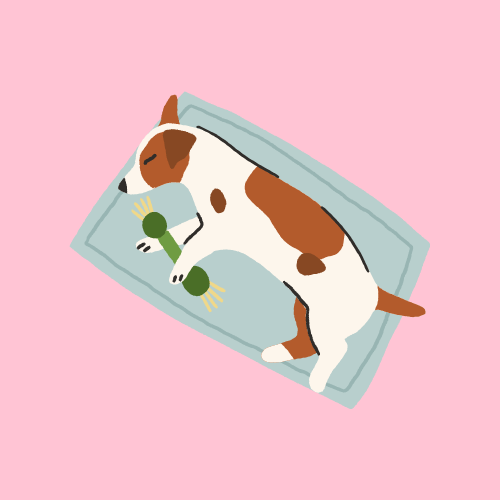Bedwetting is a worrying experience and at times can be very confusing when the wetness in our dog’s bed doesn’t seem like urine. The chances are however that the wetness in your bed is still urine but is clear and odorless due to underlying causes, such as medications or health problems. Here are some common reasons your dog’s urine might seem unusual:
- Kidney Disease
- Medications
- Liver Disease
- Diabetes

If your dog is frequently wetting the bed and it seems not to be urine we recommend you speak to a veterinarian as soon as you can. Bed-wetting isn’t normal behavior and should be addressed as soon as possible because it’s usually connected to underlying health problems.
What Is Bed-Wetting in Dogs?
Bet-wetting in dogs is a worrying experience and is certainly not normal for dogs. Bet-wetting is also sometimes known as urinary incontinence and can be caused by a number of different reasons including age, bladder conditions, or serious underlying health issues.
Common Causes of Dog Bed-Wetting
Getting Old
It’s not a secret that once a dog starts reaching a certain age they sometimes start getting issues with their bladder due to weakened muscles. It’s incredibly sad to see our pets age quicker than we but is unfortunately part of being a dog owner. Due to the weakened muscles or lack thereof dogs will sometimes be unable to hold their bladder. This happens more when are sleeping as they are less in control of their bodily functions while asleep.
Many Different Medical Problems
Incontinence in dogs can be caused by a wide variety of medical issues so it’s really essential to get some testing done by your vet to identify the actual cause. These problems can change from infections, bladder stones, and hormone changes to even more serious underlying issues such as kidney damage. There’s not really much point in trying to diagnose these symptoms at home. If a dog is frequently bed-wetting – it’s time for a trip to the vet.
Stress and Anxiety
Stree and anxiety can play a role in a dog urinating involuntarily. Some dogs are known to urinate submissively especially when they feel threatened. It could be that your dog is extremely stressed or scared in their current environment and these fears are passed into their dreams.
How to Help Your Dog to Stop Bed Wetting
Realistically the solution is going to depend on the problem and in this case, there are a number of different reasons why your dog might be wetting the bed. So first and foremost we need to diagnose the problem. Only then can we move on to accurately coming up with a solution. With that said here are some common methods used to help with dog bed-wetting.
Medication
Treating incontinence sometimes requires medications that strengthen muscles and nerves that control urination. These can include phenylpropanolamine.
Surgery
If your dog has bladder stones or a tumor, surgery might be the route to go. Sometimes the only way to fix issues with the bladder is to operate it directly. Repairing pressure or damage to the bladder can over time fix incontinence.
Lifestyle Changes
Making significant changes to the way your dog lives their life can also help reduce bed-wetting. This could even be something small like letting your dog go outside to urinate directly before bedtime. To more complex changes like dietary supplements and opportunities to play and exercise.
FAQs
What should I do if my dog is bed-wetting? If your dog is frequently bed-wetting the first and foremost thing you should do is visit the vet. It’s really that simple. A vet will be able to perform diagnostic tests such as analyzing your dog’s urine to determine the issue. Only when this has been completed can you start to formulate an action plan on how to help your dog.
Is bed-wetting in dogs treatable? It depends, some bed-wetting issues in dogs are treatable while others are not. It really all depends on the underlying causes and whether there is a feasible solution. I would suggest in most cases there is something that can be done.
Is it important to address bed-wetting in dogs? Yes, bed-wetting is usually paired with a serious underlying health condition and should be taken very seriously. Take your dog to the vet as soon as possible.
Conclusion
Dog bed-wetting especially the kind where it seems like the wetness is not real urine can be confusing and worrying. It’s usually caused by a variety of factors mostly due to old age. Although it can also be caused by bladder problems and even stress. However, try not to worry as it is possible to find treatments and explore ways to help your dog overcome their bed-wetting behavior and still live a happy and healthy life.

Doctor of Veterinary Medicine (D.V.M.) at Nation Taiwan University,Master of Science (M.S.) in Biomedical Engineering at National Taiwan University of Science and Technology




